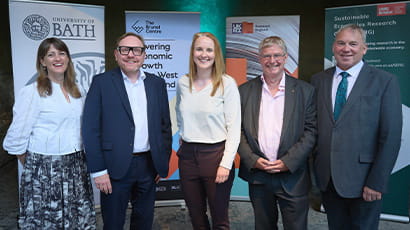UWE Bristol pioneers the development of wearable health-monitoring e-textiles
The reality of everyday use of sustainable, washable, and comfortable wearable electronic textiles for personalised health monitoring has moved one step closer, thanks to innovative work by UWE Bristol academics at the Centre for Print Research (CFPR).
“We’re taking significant steps forward in designing the ‘textiles of the future’. Imagine a COVID patient who’s isolating at home, wearing a simple printed t-shirt that is continuously collecting current body temperature, oxygen, saturation, and heart rate data,” said Senior Research Fellow Dr Shaila Afroj at the CFPR. “The technology within the t-shirt which is unnoticeable to the wearer, sends the results to their smartphone, sounding an alarm if their vital signs fall outside a normal range, and then notifies their GP or a medical monitoring service.”
This is one of the possible applications that Dr Afroj and her research team at the CFPR are passionately working on. They, in collaboration with industrial partner KYMIRA, have successfully prepared a prototype of the wearable electronic textile; it’s a simple piece of fabric that when placed around a wrist monitors a heart rate and can be worn and washed at least 10 times without compromising its monitoring ability.
As research continues with the team at the CFPR, it’s hoped the prototype will become a wearable garment, such as a t-shirt, which is unobtrusive to the patient and can be used in hospitals or at home to enable health data to be monitored remotely and continuously, and has the potential to minimise the number of NHS appointments and save ~60%* of cost per hospital patient.
To create the technology, Dr Afroj, and the research team is utilizing the advantages of the new promising material ‘graphene’ which shows incredible thermal and electrical conductivity, high elasticity, strength, lightweight, and transparency. As every atom in graphene is exposed to its environment, it can sense any small changes in its surroundings, which makes it an ideal material for sensor application.
They are also working tirelessly towards a goal to keep sustainably at the core of the research activities. Instead of buying off-the-shelf graphene which can vary massively in terms of properties, the team working in the Graphene Lab at the CFPR prepares their own graphene from scratch to be able to tune it to make it the best possible candidate for sensing application. Additionally, they choose the challenging path to avoid commonly used solvents (e.g. NMP, DMF) which are known to be toxic to humans and the environment, and even carcinogenic, and replace it with water (where the graphene is mostly unstable) to make the device the safest possible for the environment and the user.
This research also uses inkjet printing for the digital fabrication of conductive tracks of graphene onto the textile substrate. This sustainable way of fabrication produces 10 picolitres of tiny drops of material on demand, which makes it theoretically an option to print with zero material waste and minimum water usage. This is a very challenging method considering the ink preparation required to perfect and achieve high-resolution printing of continuous conductive track.
Dr Afroj has co-developed the very first all inkjet-printed graphene-based conductive patterns for wearable e-textile applications and has also co-developed highly conductive, scalable, and machine washable graphene-based e-textiles for multifunctional wearable electronic applications.
She plans to incorporate body temperature and oxygen saturation into the next prototypes, but the research is already breaking boundaries.
Dr Afroj added: “This is an exciting development in this area of research; it has brought invaluable knowledge as we continue to develop this technology. Such wearable e-textiles could be used for monitoring post-surgery patients, infants, and babies, patients in triage at the hospital, and for health monitoring of the elderly. It could also enable early detection of asymptomatic and pre-symptomatic cases of COVID-19, potentially reducing community transmission via remote monitoring of infectious diseases.”
Textiles are so ubiquitous, yet their functions have not changed much since the dawn of civilisation. Additionally, textiles have received widespread attention as a versatile platform in recent years for future wearable electronics applications. However, they are still far from the requirements of modern-day electronics.
The global textile industry is also often cited as the second most polluting industry after oil, responsible for ~8-10% of global CO2 emission, ~20% water pollution, and ~35% microplastic pollution. Therefore, radical new approaches are needed at both material and manufacturing levels to transform textiles into highly innovative, sustainable, and intelligent clothing.
This month, the CFPR will be hosting the Future Textiles 2023 Conference, focusing on New Materials, Digital Manufacturing, and Sustainability, from 28 February to 2 March 2023, in Bristol.
The conference will provide a forum for collaborative discussions to address these challenges at both academic and industry levels, develop future clothing for the next generation, and facilitate the rapid transition of such textiles from lab to market. There will be an exciting line-up of world-leading researchers, academics, and experts from industries as keynote speakers including Nobel laureate Prof Sir Konstantin Novoselov from the National University of Singapore. More information on the conference is available here (event details and registration – closing date: 24 February 2023, excluding online only).
Related news

12 December 2025
UWE Bristol’s environmentally conscious and student-focused accommodation wins three awards
Purdown View, the world's largest certified Passivhaus student accommodation development, has been recognised at Property Week Student Accommodation Awards.

25 November 2025
Health-tech start up MyCelsius launches breakthrough cooling tech for hot flushes developed at UWE Bristol’s Launch Space
A pioneering Bristol-based health-tech company developing cutting-edge cooling technology for hot flushes has credited UWE Bristol’s Launch Space incubator with playing a key role in accelerating its product development.

14 November 2025
Lecturer wins prestigious Times Higher Education award for innovation in teaching
A senior paramedic science lecturer at UWE Bristol has been named the most innovative teacher of the year in the Times Higher Education Awards 2025.

13 November 2025
Alliance Medical and UWE Bristol launch UK’s first PET-CT postgraduate certificate
In a move set to transform imaging education, Alliance Medical (AML) and UWE Bristol have joined forces to co-design and develop the UK’s first PET-CT Postgraduate Certificate (PG Cert).

13 November 2025
New AI research to revolutionise animal welfare
A UWE Bristol research project will combine behavioural science and AI to create technology that understands not only what animals do, but how they feel.

29 October 2025
UWE Bristol academic unveils breakthrough in energy-efficient AI at NATO science forum
Dr Jonathan Lancelot has developed a new form of AI that could transform how intelligent machines operate in space, defence, and remote environments.

07 October 2025
Academic playing role in project to find hidden graves in Mexico using drone technology
A UWE Bristol lecturer is playing a part in a project using drone technology to locate concealed graves in Mexico.

01 October 2025
New funding for researchers to develop trustworthy clinical AI for assessing brain activity
Researchers have received funding from UK Research and Innovation to help bring their innovative brain-monitoring AI technology closer to real-world use.

11 September 2025
New study to investigate augmented reality as an intervention for emotionally based school avoidance
A UWE Bristol researcher will support a new study exploring whether an augmented reality board game can help young people with emotionally based school avoidance (EBSA).

22 August 2025
A decade of Future Space: How UWE Bristol’s enterprise zone is powering innovation and economic growth
Tracey John, Director of Research and External Engagement, reflects on the impact of Future Space and its role as a launchpad for cutting-edge companies shaping the future of how we live and work.

11 July 2025
Wound dressings developed with support from UWE Bristol to be launched by global firm
Technology that a team of UWE Bristol scientists helped develop to aid the healing of chronic wounds will be used in new ‘smart dressings’ being launched by global medical company.

03 July 2025
Research lab The Brunel Centre opens to power sustainable and inclusive growth for the West of England
A new data and research centre designed to support sustainable and inclusive growth and industrial strategy in the region, has officially launched.






